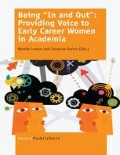Abstract
When we take into account the history of concerns around stress, wellbeing, work/life balance and sustainability in academic life (Barrett & Barrett, 2007; Edwards et al., 2009; Fitzgerald & Wilkinson, 2010; Kinman et al., 2006, 2008) it is imperative to find new ways of working in this environment.
Access this chapter
Tax calculation will be finalised at checkout
Purchases are for personal use only
Preview
Unable to display preview. Download preview PDF.
References
Barrett, L., & Barrett, P. (2007). Current practice in the allocation of academic workloads. Higher Education Quarterly, 61(4), 461–478.
Budge, K., Lemon, N., & McPherson, M. (under review/2014). Academics who tweet: ‘messy’ identities in academia. Reflective Practice Journal.
Burke, R. (1984). Mentors in organization. Group and Organization Studies, 9(93), 353–372.
Carrigan, M. (2014). Continuous publishing and the rise of the open source academic. Retrieved January 19, 2014 from http://blogs.lse.ac.uk/impactofsocialsciences/2013/12/23/continuous-publishing-andbeing-an-open-source-academic/
Connelly, F. M., & Clandinin, D. J. (1998). Teachers as curriculum planners: Narratives of experience. Toronto, ON: The Ontario Institute for Studies in Education.
Edwards, J., Van Laar, D., Easton, S., & Kinman, G. (2009). The work-related quality of life scale for higher education employees. Quality in Higher Education, 15(3), 207–219.
Fitzgerald, T. (2014). Women leaders in higher education: Shattering the myths. London, UK: Routledge.
Fitzgerald, T., & Wilkinson, J. (2010). Travelling towards a mirage? Gender, leadership and higher education. Brisbane: Post Pressed.
Flaherty, C. Kindness is possible. Washington, DC: Inside Higher Ed. Retrieved January 9, 2014 from http://www.insidehighered.com/news/2014/01/09/blog-aims-normalize-kindness-academe#ixzz2qnrT1Nic
Fransman, J. (2013). Researching academic literacy practices around Twitter: Performative methods and their onto-ethical implications. In R. Goodfellow & M. R. Lea (Eds.), Literacy in the Digital University: Learning as social practice in a digital world (pp. 27–41). London, UK: Routledge.
Heath, G. (2014). Scholarship of knowledge. In T. Fitzgerald (Ed.), Advancing knowledge in higher education: Universities in turbulent time. Hershey, PA: IGI Global.
Huber, J., & Clandinin, D. J. (2005). Living in tension: Negotiating a curriculum of lives on the professional knowledge landscape. In J. Brophy & S. Pinnegar (Eds.), Learning from research on teaching: Perspective, methodology, and representation (Vol. 11, pp. 313–336). Oxford, England: Elsevier.
Kanter, R. (1993). Men and women of the corporation. New York, NY: Basic Books.
Kinman, G., & Jones, F. (2008). A life beyond work? Job demands, work-life balance, and wellbeing in UK academics. Journal of Human Behavior in the Social Environment, 17(1–2), 41–60.
Kinman, G., Jones, F., & Kinman, R. (2006). The Well-being of the UK Academy, 1998–2004. Quality in Higher Education, 12(1), 15–27.
Kram, K. (1985). Mentoring at work. Glenview, IL: Scott Foresman.
Lemon, N., & Garvis, S. (2014). Flights of two female academics’ entry into the profession. Journal of Applied Higher Education, 6(2).
Mavin, S., & Bryans. P. (2002). Academic Women in the UK: Mainstreaming our experiences and networking for action, Gender and Education, 14(3), 235–250.
Mewburn, I., & Thomson, P. (2013). Why do academics blog? An analysis of audiences, purposes and challenges. Studies in Higher Education, 38(8), 1105–1119.
Minocha, S. (2012). How social media is transforming learning, teaching and research dialogues. IEEE International Conference on Technology for Education, T4E 2012, India, Hyderabad.
McAlpine, L., & Åkerlind, G. S. (2010). Academic practice in a changing international landscape. In L. McAlpine & G. S. Åkerlind (Eds.), Becoming an academic: International perspectives (pp. 1–17). Basingstoke, Hampshire: Palgrave Macmillan.
Minocha, S., & Petre, M. (2012). Handbook of social media for researchers and supervisors: Digital technologies for research dialogues. Retrieved March 19, 2014 from https://www.vitae.ac.uk/vitaepublications/reports/innovate-open-university-social-media-handbook-vitae-2012.pdf
Mollet, A., Moran, D., & Dunleavy, P. (2011). Using Twitter in university research, teaching and impact activities. A guide for academics and researchers. London, UK: LSE Public Policy Group.
Pearce, N., Weller, M., Scanlon E., & Kinsley, S. (2010). Digital scholarship considered: How new technologies could transform academic work. In Education, 16(1), 33–44.
Pinnegar, S., & Daynes, J. (2007). Locating narrative inquiry historically. In D. J. Clandinin (Ed.), Handbook of narrative inquiry: Mapping a methodology (pp. 1–34). Thousands Oaks, CA: Sage.
Richardson, L. (1994). Writing: A method of inquiry. In N. Denzin & Y. Lincoln (Eds.), Handbook for qualitative research. Thousand Oaks, CA: Sage Publishers.
Rothstein, M. G., & Davey, L. M. (1995). Gender differences in network relationships in academia. Women in Management Review, 10(6), 20–25.
Schwab, J. J. (1969). The practical: A language for curriculum. School Review, 78(1), 1–23.
Smith, D. (2014). A rhetoric of certainty: Modern knowledge practices in contemporary universities. In T. Fitzgerald (Ed.), Advancing knowledge in higher education: Universities in turbulent time. Hershey, PA: IGI Global.
Editor information
Editors and Affiliations
Rights and permissions
Copyright information
© 2014 Sense Publishers
About this chapter
Cite this chapter
Lemon, N. (2014). Sending Out a Tweet. In: Lemon, N., Garvis, S. (eds) Being “In and Out”. SensePublishers, Rotterdam. https://doi.org/10.1007/978-94-6209-830-5_5
Download citation
DOI: https://doi.org/10.1007/978-94-6209-830-5_5
Publisher Name: SensePublishers, Rotterdam
Online ISBN: 978-94-6209-830-5
eBook Packages: Humanities, Social Sciences and LawEducation (R0)

